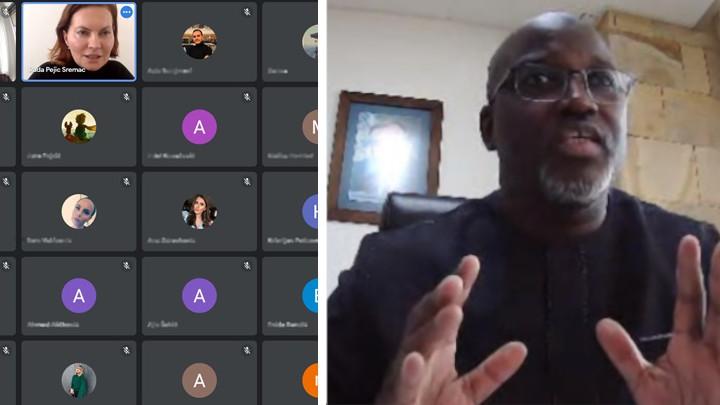Third cycle of the Mechanism’s Inter-University Video Lecture Programme resumes with a lecture delivered by Registrar Abubacarr Tambadou

Mr. Abubacarr Tambadou, Registrar of the International Residual Mechanism for Criminal Tribunals (Mechanism), on 3 February 2022 delivered a lecture entitled “The Role and Functions of the International Residual Mechanism for Criminal Tribunals”, opening a new semester of the third cycle of the Inter-University Video Lecture Programme (Programme), “International Law and Facts Established before the International Criminal Tribunal for the former Yugoslavia (ICTY)”.
Registrar Tambadou discussed with participating students important details of the Mechanism’s role in international criminal justice, delivering an overview of the legal basis, jurisdiction, structure and functions of the organisation. He concluded by providing a summary of previous judicial work and an update on the status of current cases.
During the lecture, he presented the challenges faced by the Mechanism, mandated to perform a number of essential functions previously carried out by the International Criminal Tribunal for Rwanda (ICTR) and the ICTY. Registrar Tambadou answered number of questions asked during Q&A session and discussed the similarities and key differences between the mandates of the Mechanism and its two predecessor Tribunals, highlighting the importance of the Mechanism’s role in maintaining the legacies of these two pioneering ad hoc international criminal tribunals.
Today’s lecture was the tenth in the third cycle of the Programme, which was launched in October 2021 with a lecture by the Mechanism’s President, Judge Carmel Agius and followed by former ICTY and current IRMCT Judge Alphons Orie. Other lectures have been given by experienced lawyers from the Mechanism’s Office of the Prosecutor, Chambers, and Registry, as well as by a member of the Defence, covering topics such as genocide, joint criminal enterprise, prosecution of war-time sexual violence and the rights of the accused.
The lecture series, developed and implemented by the Mechanism’s Information Programme for Affected Communities (MIP), brings together postgraduate students from 12 law and political science faculties across the former Yugoslavia in order to initiate a dialogue about the region’s recent history, the role of the ICTY and the principles of international criminal law and international humanitarian law.
More than 120 postgraduate students have taken part in this cycle of the Programme via videoconference, including law students from the Union University from Belgrade, the University of Donja Gorica, the University of Niš, the University of Podgorica, the University of Priština, the University of Sarajevo – Law Faculty and Faculty of Political Sciences, the Ss. Cyril and Methodius University of Skoplje, the University of Split, the University of Vitez, the University of Zagreb and the University of Zenica.
The third cycle of the Programme will continue with lectures delivered on a weekly basis until mid-March 2022.
The Programme is part of the broader MIP, which launched in January 2019 and aims to contribute to increased awareness and knowledge among affected communities regarding the 1990s conflicts in the former Yugoslavia, based on the ICTY and Mechanism cases. The MIP is generously supported by the European Union and the Swiss Federal Department of Foreign Affairs.